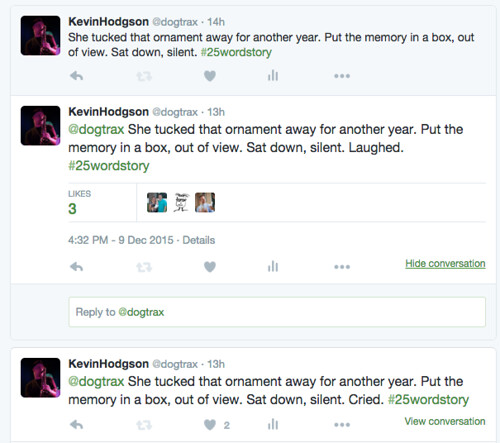Yesterday, I wrote this flash fiction story on Twitter with the #25wordstory hashtag. You know … write a story in 25 words (give or take a word here and there, that’s my interpretation). My aim was to infer another story, behind the ornament being put away, and also, to shorten each sentence to make the story more and more compact by the end.
She tucked that ornament away for another year. Put the memory in a box, out of view. Sat down, silent. #25wordstory
— KevinHodgson (@dogtrax) December 9, 2015
I let that story sit and then realized, if I added the word “cried” at the end, as a last single-word sentence, it would change the emotion of the story. While before it wasn’t clear why she was putting the ornament away, now with that one word, you have a better idea (albeit, still not completely clear. Is she crying over remembering? Over loss? Sadness? Maybe happiness?)
@dogtrax She tucked that ornament away for another year. Put the memory in a box, out of view. Sat down, silent. Cried. #25wordstory
— KevinHodgson (@dogtrax) December 9, 2015
And what, I wondered, would happen to that story — still so very short — if I changed that last word to something else. Another emotion. What if I made it “laughed” or “smiled”? Would the whole tenor of the story shift? I think so. I used “laugh.” But now I wonder, after reading it with some distance, if “smile” would not have been better.
@dogtrax She tucked that ornament away for another year. Put the memory in a box, out of view. Sat down, silent. Laughed. #25wordstory
— KevinHodgson (@dogtrax) December 9, 2015
It’s interesting what you can do in the small confines of a Twitter story. A single word is a powerful anchor of emotion.
Peace (in the tiny),
Kevin

Memory boxed http://youtu.be/di2bJA5dTyU
As he closes the box.
http://tachesdesens.blogspot.fr/2015/12/inference.html